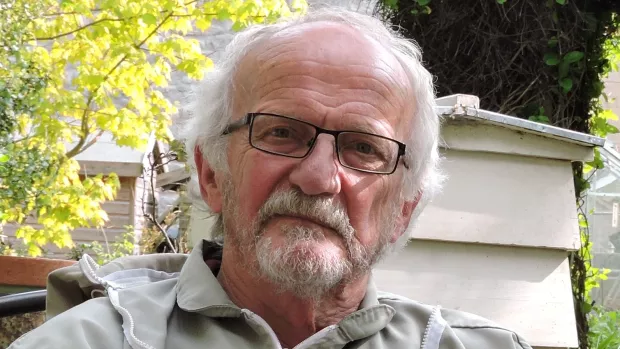
My bladder issues cause me huge anxiety
Jordan was diagnosed with MS in 2019. He describes how he has gradually come to accept his diagnosis, and his ongoing efforts to be open about symptoms he finds embarrassing. He lives with his wife and one-year old daughter in Kent. He recently ran the London Landmarks Half Marathon for the MS Society.
I’ve been struggling with bladder issues since I was diagnosed. I have these awkward moments where I feel I need to go to the toilet, but then when I get there nothing happens. If I ignore it, though I come very close to having an accident.
It causes me huge anxiety, like when I was running the half marathon and wondering where the toilet would be when I finished.
My bladder issues are the most awkward thing. I’m still in the motions of being able to talk more freely about it.
I feel like when you start talking about your bladder, straight away people that don’t understand think, oh he’s wet himself, or he has had accidents.
You get looked at a certain way as soon as you start saying it affects you. I have to make choices because of my bladder so that straight away makes them think that.
Planning to avoid accidents
It doesn’t stop me making social plans, but it has made me more alert. When I get told about something, while the other person is still talking, I’m thinking toilets - so going to parks, queuing up in long lines. I might avoid drinking fluids because I don’t want to queue in a line when I need to go to the toilet.
It’s never been really understood by my health care professionals either. It’s not new, I mentioned it when I was first diagnosed. I was going through my letters the other day, and it says, 'Jordan’s been speaking about his bladder' and that was back in 2019.
Discovering I had MS
The first symptom I experienced was pins and needles in my feet. People I spoke to then, including doctors, were saying that maybe my boots were too tight. They suggested I try some workman boots to see if that made a difference. I was also getting a vibrating feeling down the back of my spine that went down my legs. I now know it was Lhermittes sign, which some people call the barber chair symptom because of how it affects you when you look down to your chest.
When I got my diagnosis – it makes me laugh now – I didn’t understand my neurologist was talking about me. He explained what MS was and about the lesions. He had my MRI scan, with the images on his laptop. He was showing me all the pictures, and I was like, ‘OK, why are you showing me this?’ And he said, ‘you have MS’. And I was like, ‘OK’. Then he said you have multiple sclerosis. I said, ‘me?! No, you’ve got the wrong picture, that’s someone else’s brain’. So it was hard to take in. It took me a while.
I think it’s only been the last year and a half that I’ve accepted the fact I have MS.
Fatigue is everyday, every single day. Fatigue is my biggest thing. And it’s hard when I get too hot. When I was doing one of my treatments one of the other people there that had MS said I should try to log what temperature my body can take before I start feeling funny and getting symptoms. That helped a lot. Now I avoid, or try to avoid, situations where I might get too hot.
I’m a mechanic, they call us service technicians. For fun I spend time with my daughter. I work Monday to Friday, so when I’m home I spend time with my daughter and my wife. We go places and do family stuff.
This life’s not finished
I think going to events run for people with MS that other people with MS put together, and seeing a lot of other people with MS made me realise I’m not the only one. When I looked further into it I realised that this life’s not finished. Then I remembered that my neurologist at the time said it’s not life threatening, but it is life changing, and that is what I sort of had to come to terms with. So what that means is you have you re-adapt your life, and that’s what I’ve done.
I’m quite confident, I don’t need to hide things, but I have some symptoms like, if my balance is a bit shaky, I’ll just deal with it myself as opposed to saying ‘oh by the way, today, I’m…’. I deal with a lot of things by myself. But everyone close to me already knows or sees the situation, that I have day to day struggles.
Speaking up to support others
As long as I know I’m helping someone else, that’s enough for me to talk about it. I know I’m not the only one. As long as it might help someone, it’s cool.
It’s important to speak out about this topic. Even though I’m at the point now where I can talk about it, there was a period where I couldn’t – it took about two and half to three years.
I’ve been to events where people are crying and stuff and they don’t know how to deal with it, or they’ve got kids and they don’t know how to tell their kids. So I’ve seen what it does when you hold it in. I don’t want anyone to feel how I felt in the first six months, the first year.
Dealing with changing battery levels
With MS some days you feel fully charged. That’s how I explain it to someone that doesn’t have MS. It’s like a phone battery – when it’s on 100%, that’s a good day, and then when it’s dying and on 5%, that’s how you might feel the next day, or even in a few hours’ time. It’s like your battery is on a cycle, where it’s always up and down. So when I was training – some days I’d get home, quickly go upstairs and get changed into my running gear and then run, run, run. And then other days I really didn’t feel able to run.
I really got down about that, because I knew I needed to train because of the marathon. But some days I just feel really flat. But I got through it. During the marathon I experienced some symptoms – my left leg is slightly weaker than my right leg and that gave me some problems.
But seeing other people there with the same running vest – running for the MS Society, too – motivated me to keep going.



